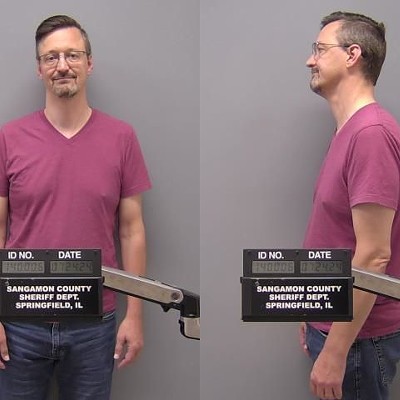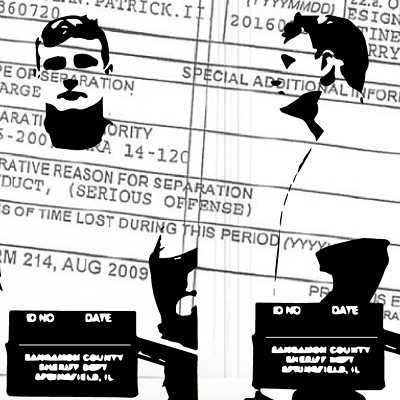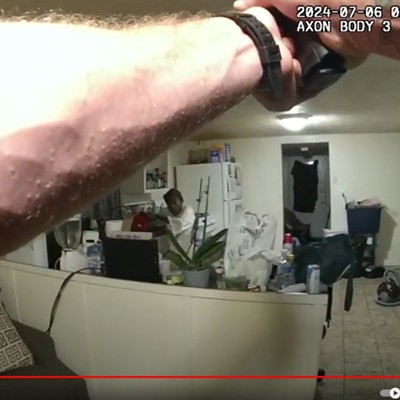Derrick Davis would like to thank the state lawmakers who passed a comprehensive crime bill in 2021 – and tweaked the law three times since then, most recently this month – that on Jan. 1 will make Illinois the first state to completely eliminate cash bail.
"Thank you for giving us a chance to get out and prove that we're not all the same," he said.
Davis, 34, a Jacksonville resident who formerly lived in Springfield, said his recovery from substance-use disorder was delayed by several years because of stints in the Sangamon and Morgan County jails when he couldn't afford to make bail and enter treatment while the nonviolent criminal cases connected with his substance use proceeded in court.
Those delays resulted in more crimes, convictions and a total of nine years in state and federal prison, he said.
"I just don't think it's a fair system," he said.
Despite spending time in prison for crimes ranging from burglary and home invasion to possession of methamphetamines, after his parents posted $2,500 bail in September 2020 for his most recent case, Davis used the time outside jail well. He took part in a vocational education program at Lincoln Land Community College and then became a Laborers union apprentice. He now earns almost $30 per hour in his work on the $220 million-plus renovation project at the Illinois Capitol.
In his spare time, Davis volunteers by speaking to others dealing with substance-use disorder, encouraging them to avoid his path.

"We're not all trying to live a life of crime," he said.
The thanks Davis offers isn't shared by everyone who took part in the debate over the SAFE-T Act, which stands for Safety, Accountability, Fairness and Equity-Today. Emotions and expectations remain high on both sides as a complex implementation period begins. Critics warn of potential dangers to the public at a time when stresses related to the COVID-19 pandemic have contributed to increases in crime in some parts of the state.
A key section of the law, known as the Pretrial Fairness Act, is scheduled to take effect Jan. 1, unless the date is delayed or parts of the legislation are derailed by lawsuits from prosecutors in about 60 counties, including Sangamon, challenging its constitutionality.
Worries remain even as the legislation, which gained urgency among the Illinois Legislative Black Caucus in the wake of the May 2020 death of George Floyd at the hands of Minneapolis police, is hailed by supporters as groundbreaking civil rights legislation.
The major groups opposing the bill or critical of it in the past took a neutral stance on the trailer bill, which is intended to modify the main legislation. Many concerns aired by law-enforcement agencies and other opponents of the SAFE-T Act were addressed by the Democratic-controlled General Assembly in the fall veto session through House Bill 1095. The 308-page bill passed Dec. 1 with no Republican votes and was signed into law Dec. 6 by Gov. JB Pritzker, also a Democrat.
Backers say the law will more fairly base an accused person's freedom prior to trial on the risk he or she poses to the public or the risk of flight and not showing up for court, rather than the person's ability to afford bail.
They portrayed the numerous changes made through the recent trailer bill as clarifications that, in some cases, were made in response to misinformation from Republicans and others about the law in the run-up to the recent elections for governor and seats in the General Assembly.
But opponents said the trailer bill's changes were major and proved that the Democrats' allegations of GOP "fear mongering" were disingenuous because many parts of the law that Republicans criticized were changed significantly.
"These were not minor clerical fixes," said state Sen. Steve McClure, R-Springfield. "These were big changes to who can be detained."
Because of the nature of negotiations in the legislature, McClure said he wasn't surprised that law-enforcement groups ended up being neutral on the trailer bill. His interpretation of the Democratic stance goes like this: "'OK, you can either help us make things a little bit less bad, or it's just going to take full effect, and you know, all the most horrible provisions are going to remain in the bill.'
"So when you're negotiating with a gun to your head, you don't really have a choice," McClure said.
Jim Kaitschuk, executive director of the Illinois Sheriffs' Association, said lawmakers "did a number of things to make the process more implementable, and I appreciate that."
However, he said more tragedies resulting from the release of defendants are "inevitable." And he said he is concerned about the short time period to train police on the recently adopted changes, as well as the lack of adequate funding from the state to help counties accommodate the swift hearings on detention and pretrial monitoring requirements.
Sangamon County Sheriff Jack Campbell, a fellow Republican and consistent critic of the SAFE-T Act, said: "I still believe the entire bill should have been repealed – it's that bad. It still impacts our safety and empowers criminals. Criminals aren't going to be held as accountable as they had (been) in the past."
On the other hand, Sarah Staudt, a former defense attorney, said there's "tons of evidence" from Loyola University Chicago and other researchers on bail-reform efforts in Cook County and nationwide, as well as the documented harmful impact of bail on poor people who are disproportionately Black and brown. That information, she said, indicates Kaitschuk and Campbell's predictions about bad things happening won't come true, and crime rates won't rise.
McClure and other critics say the pro-SAFE-T Act research is biased.
Staudt, director of policy for the Chicago Appleseed Center for Fair Courts, which is part of the Illinois Network for Pretrial Justice, said: "We do have a bill now where we have a lot of agreement. We've got to give this bill a chance to work."
Making changes to the SAFE-T Act
In signing HB 1095, the governor's press office said in a news release that the bill, consisting of a "series of amendments and clarifications ... addresses misinformation related to the act." Pritzker's press office, in legislative shorthand, said the bill clarified "the detention net, expansion processes for transitioning to cashless bail on Jan. 1," and specified definitions of "willful flight and dangerousness, among other changes."
The changes made it clear that people currently in county jails wouldn't be let out of jail on Jan. 1, though those detained could ask for a hearing to request that the new system be applied to their situation.
Critics of the original SAFE-T Act said prosecutors would have to meet the difficult and almost impossible burden of proving "willful flight," defined as "planning or attempting to intentionally evade prosecution," if they wanted to use that reason to detain without bond a person on a variety of charges, including second-degree murder, robbery, burglary, arson, kidnapping, aggravated battery, aggravated DUI and aggravated fleeing and eluding police.

If prosecutors wanted to detain without bond a person based on the suspected harm he or she would pose if released, they had to prove the person posed a threat to a specific person or persons. The charges covered included first-degree murder, sexual assault, aggravated arson and vehicular hijacking, or carjacking.
The changes adopted in the trailer bill made it easier to detain defendants on all of the highlighted charges. The definition of willful flight was made less rigid so it could include a history of repeated failure to show up for court hearings. The definition of potential harm to the public was expanded to include "a real and present threat" to the safety of "the community."
The changes also expanded the list of offenses that made defendants eligible for detention. The list now includes certain forcible felonies, hate crimes and attempts of crimes that were otherwise detainable. Also added were felonies that involve the threat or infliction of great bodily harm or permanent disability or disfigurement.
John Patterson, a spokesman for Illinois Senate President Don Harmon, D-Oak Park, said the "underlying goal" of the expansion of the detention net "is that dangerous people should be detained, while those who merely lack resources and do not pose a threat should not."
The trailer bill also clarified language of the SAFE-T Act to address a situation police deal with often – trespassing on private property, which is a Class B misdemeanor in most cases. It's now clear that police can arrest, detain and remove people committing Class B and C misdemeanors after being issued a citation or a notice to appear in court.
Even with the improvements, McClure, a former Sangamon County assistant state's attorney, said he voted against the latest trailer bill for several reasons, which include:
*Judges for the first time can count time that a defendant spends on electronic monitoring outside his or her home while awaiting trial as time served on a future sentence after conviction. McClure called that new option for judges "bizarre";
*Democrats refused to include Republican leaders in negotiations on the latest revisions; and
*The SAFE-T Act won't address rising crime in the state and will further harm police recruitment efforts.
"They basically bashed the brains in of law enforcement and the citizens of this state, and now they're going, 'Oh well, sorry we bashed in your brains, and here's a box of chocolate,'" McClure said.
"There are people behind this bill who do not believe in prison," he said. "They do not believe in jails. They care more about protecting criminals than protecting victims." Advocates of the SAFE-T Act have denied the allegations.
Sangamon County State's Attorney Dan Wright declined comment on the SAFE-T Act because of the state's attorneys' legal challenges, which are pending in Kankakee County Circuit Court. A decision is due by Dec. 28. Sangamon County Public Defender Craig Reiser also declined requests for comment.
Costs to implement the SAFE-T Act
The Sangamon County Board has set aside about $1 million in 2023 for additional costs expected to be incurred by the office of the sheriff, public defender and state's attorney, partly for new staff and partly for increases in salaries for existing staff, said board Chairman Andy Van Meter, a Republican.
"We did not raise taxes to do this," Van Meter said. "Our budget for 2023 estimates a slight decrease in the property tax rate because of savings in our required pension contribution. The decrease would have been much greater if we hadn't had to provide this additional funding for public safety."
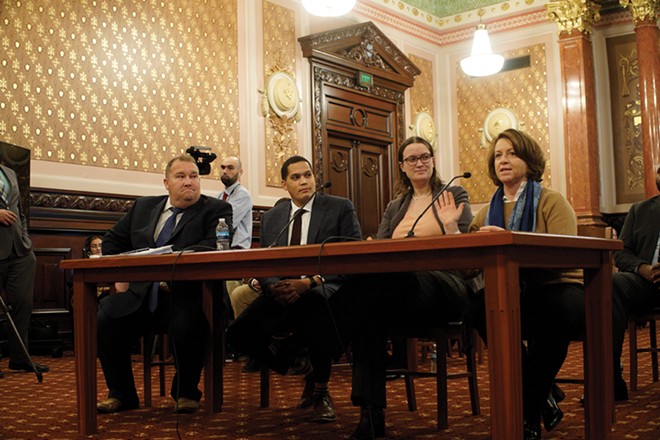
He added, "The legislature's 'fix' to the SAFE-T Act" may require the county to open the courthouse on Sundays to conduct full, formal hearings, "which will add additional costs we haven't fully calculated yet."
The trailer bill creates a grant program, subject to future appropriations, for increasing funds for public defenders – but not state's attorneys – to handle the expected increase in caseloads.
The elimination of cash bail will mean the Sangamon County sheriff's department no longer will generate about $100,000 per year from the $30 fee the department can collect from each defendant posting bond. But with an annual budget of $22 million, that loss won't have much of an impact, Campbell said.
Restitution to crime victims, which can come from bail that's posted, will drop, McClure said.
Two different narratives
McClure, Campbell and other critics of the SAFE-T Act took issue with the notion that there's widespread suffering by defendants and their families when the requirement for bail keeps defendants detained for days, weeks or months.
"Unfortunately, we still have to accept that crimes are committed, and there is a lot of work that needs to be done to reduce them, and we have to have a system to address that," Kaitschuk said.
Campbell said there's a simple solution to the problems inmates encounter when they can't make bail. "How about if they don't commit a crime?" he asked.
The sheriff said his staff took a look at the backgrounds of 25 random Sangamon County inmates among the 340 at the jail in August and found that they averaged 26 previous arrests as adults. The low was one arrest, and the high was 87, he said. The number of convictions wasn't available, he said.
Advocates of the SAFE-T Act act as if most jail inmates "are good people who don't have any money," "just made a mistake" and could work a normal job if not detained, the sheriff said. Campbell said his unscientific look at the jail population's criminal history indicates that for most detainees, crime is "just what they do for a living."
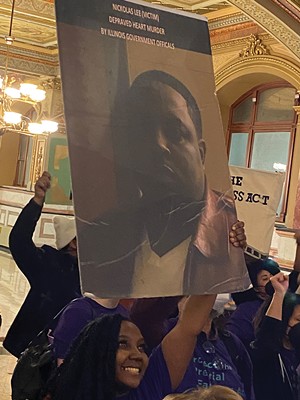
Staudt, however, who is part of the Illinois Network for Pretrial Justice, said Campbell is offering a "very narrow and unsupported view" that doesn't account for years of research and the documented impact of police contact with low-income neighborhoods and racial differences in policing.
"This is very much not a solution in search of a problem," she said. "When we jail people we don't need to, we destabilize lives."
Pretrial detention, even for short time periods, disrupts jobs, families and makes people more likely to be arrested in the future, Staudt said. People jailed pretrial also are more likely to eventually plead guilty and be sentenced to prison, she said.
"It is an unjust practice to charge people a fee for their freedom, especially when it is an arbitrary amount that is decided incredibly quickly without any real consideration of how their life might be impacted or if they're even actually any kind of public safety risk," she said.
The Network for Pretrial Justice in November released a report on a court-watching project in Sangamon, Peoria, McLean, Champaign, DuPage, Kane and Winnebago counties that the network said found bond amounts being set arbitrarily.
"Court watchers consistently observed judges knowingly set bonds well above what accused people said they could afford – or not ask what they could afford at all," according to the report.
Though parts of the report included subjective observations by court watchers, Kareem Butler, a pretrial justice fellow at the Chicago Appleseed Center, said, "We documented a lot of dehumanizing treatment of people in bond court and judges using language that was condescending and ignorant toward people and their mental health conditions."
According to the U.S. Department of Justice's Bureau of Justice Statistics, most people held in Illinois jails statewide in 2019 (89%) were male, 50% were Black, 33% were white, and 14% were Hispanic. Most (82%) were being held on felony charges, and most (89%) were being held pretrial.
From 2020 to 2021, individuals admitted to Illinois jails pretrial spent an average of 34 days there, while the average number of days in jails outside Cook County was 15 days, according to Loyola researchers.
Loyola researchers say almost two-thirds of inmates facing felony charges in Illinois are not in jail custody or under any kind of supervision or monitoring while they await trial. That situation, they said in an October research brief, "casts doubt on a central assumption behind much of the criticism" of the SAFE-T Act – that the cash bail system "protects the community by keeping people behind bars until their cases are resolved."
"We don't have statewide numbers for this," the researchers wrote. "But data from a range of urban, suburban and rural counties we've examined so far suggest that, under current practice, the majority of those charged with detainable offenses are released within a week."
Shelly Heideman, executive director of the Springfield-based Faith Coalition for the Common Good, said the coalition supports the SAFE-T Act and its amendments. "To me, it's definitely a racial and economic-justice issue," she said.
Teresa Haley, president of the Illinois and Springfield branches of the NAACP, said the groups back the law because "the justice system is just not fair" to Black people. "We know Black men and women are imprisoned based on social economics. We sit behind bars longer."
She said she hopes the "scare tactics" being used by SAFE-T Act opponents are overcome by truth. "I think everyone needs to take a deep breath and be educated with the right information," she said.
Widow seeks justice
For Cassandra Greer-Lee of Chicago, the SAFE-T Act brought a measure of justice after the April 12, 2020, death of her husband, Nickolas Lee, 42. He was one of the first Cook County Jail inmates to contract COVID-19 and died from it at John Stroger Hospital in Chicago, she said. Greer-Lee said her husband was being held pretrial in the jail for an alleged 2018 armed robbery.
Because both state and federal charges were pending, and because the federal system doesn't allow for bail, Nickolas might not have been released pretrial even if the SAFE-T Act had been in effect, Cassandra Greer-Lee said.
But she believes the SAFE-T Act would have made it less likely for him to catch COVID because fewer inmates would be in the jail and social distancing would have been more effective.
"No matter what he was charged with, he didn't deserve to die," she said.
Whether county jails will serve fewer, more or the same number of inmates under the SAFE-T Act is unclear.
"Your freedom shouldn't be determined by your wealth," Greer-Lee said.
Dean Olsen is a senior staff writer at Illinois Times. He can be reached at [email protected], 217-679-7810 or twitter.com/DeanOlsenIT.




